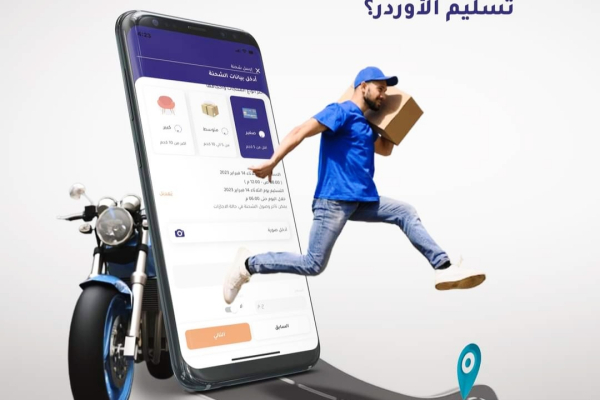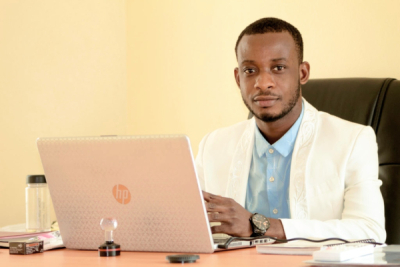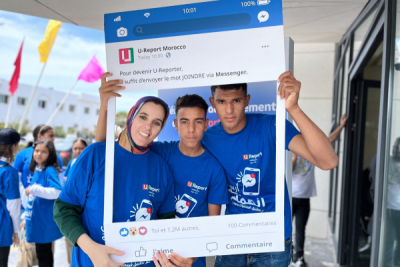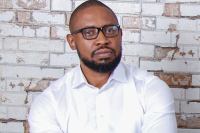The solution is the result of a partnership between unicorn startup Fawry and Softec Technologies. It connects merchants with a network of self-employed delivery personnel.
Roaderz, an innovative digital solution created by the Egyptian unicorn Fawry, enables merchants to facilitate deliveries to their customers through a network of independent delivery drivers. The venture was established in 2022 as a collaborative effort between Fawry, Samer Gharaibeh (founder of the delivery startup Mylerz), Ammar Zawaideh (a corporate finance expert), and Softec Technologies.
“Our goal with Roaderz is to create a solution that can also have a broader social impact, by putting smaller businesses on a level playing field with larger competitors, providing couriers with flexible work and income opportunities, and reducing carbon emissions by decreasing the average kilometers traveled by a shipment before it reaches the end-user,” said Fawry’s CEO, Ashraf Sabry, in 2022.
The solution has a mobile app accessible on Android and iOS. Merchants can sign up to access the services offered after downloading the app. To order a delivery, they have to post a request and one of the available self-employed delivery agents will undertake the task.
When the package is picked up, the merchant can see from the application an estimate of the delivery time and follow the package in real time until it reaches its destination. Payments are handled by Fawry.
Since its launch, Roaderz’s Android app has been downloaded more than a thousand times. The solution intends to cover all of the governorates in Egypt but, there is no international expansion plan for the time being.
Adoni Conrad Quenum
The Arab Administrative Development Organization (ARADO) will hold a forum on governance in the digital age from June 19-21 in Casablanca, Morocco.
The forum aims, among other things, to provide participants with the knowledge and skills needed for effective digital transformation and recent technical developments in this area. It will also help identify what institutions need to do and the challenges they must prepare for when the digital transformation process is completed.
He is a finance graduate with a passion for using technology to develop practical solutions. With FeexPay, he enables merchants to collect payments online.
Jean Hugues Houinsou (photo) is the founder and CEO of JH Trading Group, a UK-registered group. Through that group, in May 2023, he launched FeexPay, a mobile payment aggregator that allows merchants to collect mobile money and card payments online.
FeexPay has four notable features. The first, FeexLink, allows merchants to generate secure payment links and send them to buyers via mail or any other communication channel. FeexCorporate, the second feature, allows users to send multiple payments simultaneously and pay staff, suppliers, etc…
The third feature is FeexMarket, a checkout solution. It allows users to create their e-shops and automatize payments. The last feature is FeexPage, a feature that personalizes checkout pages to improve customer experience.
FeexPay is an intuitive platform that is easy to learn. The commissions it collects on transactions processed are also the lowest in the Beninese market. They range from 1.5-1.7% of mobile money payments to 4.5% for card payments.
The fintech startup also gives users the possibility to make customized integrations. When interviewed by We Are Tech Africa about FeexPay's goals, Jean Hugues Houinsou said that the startup wanted to become the leading payment aggregator in Africa. “[...] We have initiated a process to expand to other countries, in addition to Benin,” to improve continental financial inclusion he said.
Jean Hugues Houinsou holds a master's in banking and finance from the National School of Applied Economics and Management in Benin. He is certified by the University System of Maryland in the application of the Scrum methodology to agile project management and by Harvard University in the fundamentals of leadership. He also holds Google certifications in digital marketing, Adwords, and Analytics, among others.
Apart from FeexPay, his group founded La Vedette Media, a web marketing agency. From 2019 to 2020, the versatile entrepreneur worked as the project manager of Google Digital Skills for Africa. Currently, he is the co-leader of the Google Business Group in Cotonou.
Melchior Koba
Burkina Faso is under a growing terrorist threat since 2015. To effectively respond to these attacks in the country, the government has turned to digital technologies, which offer a range of tools to counter insecurity.
The National Gendarmerie of Burkina Faso, on Tuesday, May 16, inaugurated its Digital Brigade for Alert and Assistance (BNVAA).
The brigade is accessible via its web platform and a mobile application “Ma Gendarmerie BF”, available on Playstore and Appstore. It aims to provide citizens with a direct and accessible communication channel with the national gendarmerie.
According to Lieutenant-Colonel Evrard Somda, Chief of Staff of the National Gendarmerie, the digital brigade "is a practical and quick way for the gendarmes to interact and respond to users’ concerns every hour of the day, monitor social networks to analyze the feelings of people on particular topics or detect subversive messages and comments, publish safety tips and alerts in case of incidents or disasters, and give recommendations to guard against burglary or online scams.”
The BNVAA is part of the Burkina Faso government's drive to leverage digital technologies to bring government services closer to the population. It was set up to support the national gendarmerie in its fight against growing insecurity.
The brigade will be managed by trained personnel grouped under two teams. The first team will oversee the collection and analysis of digital data and evidence and handle interactions with the population, through a chatbot assisted by a security agent. The second team will take care of the creation of awareness materials and produce intelligence reports on the security situation.
According to the executive, the objective is to optimize the performance of the gendarmerie by strengthening and consolidating its connection with citizens. The BNVAA also aims to ensure the physical presence of territorial brigades and intervention units, as well as reduce waiting times when citizens request their services.
Samira Njoya
The Moroccan Youth Ministry and UNICEF launched Tuesday (May 16), a digital platform for youth engagement.
The platform, dubbed U-Report Morocco, will allow young people aged 14 to 25 to express themselves and share their views on issues affecting them and their communities as a whole. The goal is to foster citizenship and make their voice count in policy-making processes.
CTIC Dakar has established itself as a driving force in the Senegalese entrepreneurial ecosystem. As an incubator and accelerator, it has provided critical support to the country's tech start-ups, helping transform their innovative ideas into successful businesses.
CTIC Dakar is a Senegalese incubator created in 2011. It is the result of a public-private partnership led by FICTIS, the network of ICT incubators operating in Senegal. It aims to foster the development of growth potential SMEs in West Africa.
It is placed under the administrative supervision of the Ministry of Economy and Finance and the technical supervision of the Ministry of ICT. Currently, it is headed by Isidore Mbodji, its Executive Director.
The innovation hub offers a full range of services and programs to support start-ups at each stage of their development. It has three main support programs. The first one, Buntutekki, is a 3- month pre-incubation program that supports budding entrepreneurs from the ideation phase of their project to the business plan and formalization.
The second, Incub'Action, is a tailored 2-year incubation program that aims to mature startups’ economic models, allowing startups to easily conquer markets. The last one, Adduna, is a six-month acceleration program that allows existing companies to develop, and structure operations to reach the next growth stage and attract investors.
In about seven years of operation, the incubator has supported over 176 companies and start-ups. They include M-Louma, which connects agriculture value-chain actors, People Input, an African web and mobile service provider, and the web services company Inaota. It has coached more than 2,400 project leaders and organized more than 1,200 working sessions.
In 2022, the incubator took part in BAM: Empowering African Accelerators, a program designed to enable accelerators and incubators to amplify their impact and support future entrepreneurs in their respective operating regions.
In addition to being an incubator and accelerator, CTIC Dakar is positioned as a real player in the Senegalese entrepreneurial ecosystem. It regularly organizes events (more than 150 already), workshops, and conferences to promote exchanges and collaborations in the start-up community.
Supported by Sonatel, World Bank Group, and Info Dev, among others, CTIC Dakar also plays an active role in promoting technological innovation in Senegal, by encouraging research and development. It also supports ICT initiatives.
Melchior Koba
With over 17 years of tech and consulting experience, he helps consumer goods manufacturers easily sell their products.
Onyekachi Izukanne (photo) is the CEO and co-founder of TradeDepot, a digital platform that connects small African retailers with global consumer goods producers.
His platform, founded in August 2016, offers several services. First, it offers real-time data-driven trade intelligence to get a “product in the right retail stores at the right time.”
It also handles inventory, shipping, returns, and customer service for suppliers through its distribution centers across Africa. In addition, it provides microcredit to retailers to enable them to purchase more products and grow their businesses.
“Our focus is distribution, which is a very feasible problem because to purchase whatever item we need, distribution is necessary in getting it from the maker to us. Whether it is a shirt, food, or digital item, there needs to be distribution,” Onyekachi Izukanne told Nairametrics in 2022.
With TradeDepot's B2B platform, retailers can order from wholesalers 24/7 without encountering out-of-stock issues. By 2020, TradeDepot already had more than 200 employees and about 40,000 micro retailers using its platform to source basic household products from manufacturers such as Unilever, Nestlé, Danone, and Kellogg's.
Before TradeDepot, Onyekachi Izukanne co-founded C2G Consulting, a consulting and B2B integration firm. He served the firm as a managing partner between 2004 and 2017. Since 2018, he is its non-executive director.
His professional career began in 2013, as a consultant at Mobilizr LLC, a company that connects brands with a large community of social media users who act as their brand ambassadors.
Melchior Koba
The International Telecommunications Union (ITU) recently opened applications for its virtual mentorship program Women in Cyber (WIC). Applications are open to women residing in Africa, Arab regions, Asia, and the Pacific till May 22.
The program was initiated about three years ago to foster gender inclusion in the cybersecurity industry.
The solution aims to contribute to the achievement of some sustainable development goals related to the quality of education and the reduction of gender inequalities.
iSchool is an edtech platform that allows children aged 6 to 18 to learn software development, artificial intelligence, big data, robotics, and the Internet of Things (IoT). It was developed by an Egyptian startup, founded in 2018, by Mohamed Algawish, Mustafa AbdelMon'em, Ebrahim Youssef, and Mohamed Nabil.
It has no mobile app yet. So, to access its courses, users need to visit its web platform. For 6 to 8-year-olds, it offers a coding program that teaches them programming basics. For kids aged between 9 and 12, it teaches programming languages such as Python or JavaScript. With iSchool, learners aged 13 and beyond start building project portfolios in preparation for their university studies or entry into the job market.
To effectively teach learners, the edtech opted for the STEAM (Science, Technologies, Engineering, Arts, Mathematics) methodology, which allows students to learn through experimentation to better assimilate the concepts inherent to each discipline. Classes are conducted in Arabic and English and learners are grouped into teams of 4-6 students of the same age range for 2 hours 30 minutes of learning each week.
In 2018, iSchool was one of the winners of the Bizex startup competition. Currently, it claims more than 10,000 students enrolled, 250 instructors, and more than 650,000 hours of training delivered. According to its data, its students are mainly in Canada, the United States, Egypt, Sudan, Jordan, and Palestine.
Since its launch, it has raised $160,000 to develop its platform and expand to other markets in North Africa and the Middle East.
Adoni Conrad Quenum
Africa’s low bancarisation rate is an opportunity for many fintech companies to thrive on the continent. These companies, both local and international, offer interesting solutions to improve financial inclusion.
Kowri is a fintech solution developed by Ghanaian firm DreamOval Limited. It allows access to financial services such as loans as well as fund transfers and reception.
“Kowri Business is an integrated Fintech Platform that simplifies how banks and fintech acquire merchants, switch transactions and process local and international remittances to and from any Money Transfer Operator,” DreamOval indicates on its web platform.
Users can access Kowri's services from its mobile application, available on Android and iOS. Once they create their Kowri account, they can access services like fund transfer, airtime, and data top-up as well as utility bill payment.
With its Kowri Business feature, it gives users the possibility to collect payment across mobile and digital channels. By signing up for the service, businesses “get access to a unique payment link, USSD code, QR code, and their own back office portal to enable them to collect payments across multiple mobile money wallets, cards, and cash.”
Through its Kowri Protect feature, the solution offers free insurance coverage to merchants that use the business feature. “Kowri Protect is an insurance solution designed to protect your store against various natural disasters, burglaries, fire, floods, and more,” Kowri indicates.
In May 2023, the solution signed a partnership with US-based student loan provider Mpower to offer loans to African students pursuing Master's degrees in Canada and the US. It plans to expand across Africa but, to achieve that plan, it may have to organize funding rounds.
Adoni Conrad Quenum
More...
He is a successful entrepreneur and investor who owns an investment holding focused on African tech firms. One of his companies, CarePoint, has become a reference in the African health sector.
Sangu Delle (photo) is a Ghanaian entrepreneur, investor, and author. He is the founder and CEO of CarePoint, a state-of-the-art healthcare company, which owns over 65 healthcare facilities in Egypt, Nigeria, Kenya, and Ghana.
He earned a Master of Business Administration and a Juris Doctorate from Harvard. He also has a Master's in international human rights law from Oxford University, and holds a doctorate in economic anthropology and African studies from the University of Birmingham.
CarePoint was formerly known as Africa Health Holdings Ltd. It operates six brands, Seha Healthcare, Lily Hospitals, CarePoint, Meridian Health Group, Rabito Clinic, and My Care Mobile in its operating countries. With more than 1,500 patients treated, more than 10,000 patients reached through telemedicine and more than 5,000 surgeries and essential procedures performed, the company employs 1,993 people and is one of the leaders in the sector in Africa.
Sangu Delle is also the founder and executive chairman of Golden Palm Investments, a pan-African venture capital firm focused on supporting leading African entrepreneurs who are leveraging digital technologies to solve some of the major challenges facing the African continent.
He is also the co-founder and president of Cleanacwa, a nonprofit which works to bring clean water to Ghana's least developed areas. The Eisenhower Fellow is a member of YPO, a global community of leaders, and the director of mPharma, a healthtech company that improves access to medicines.
A TED Fellow and term member of the Council on Foreign Relations, Sangu Delle was voted Young Person of the Year by Future Awards Africa in 2014. In 2015, he was named one of the 30 most promising African entrepreneurs by Forbes Magazine. Some four years later, New African Magazine named him one of the 100 most influential Africans.
The 2021 World Economic Forum Young Global Leader is the co-author of "Making Futures: Young Entrepreneurs in a Dynamic Africa." He has also presented TED talks on mental health, gender equality, and African macro-finance.
Melchior Koba
The country was initially scheduled to launch its satellite into orbit in 2021. Due to the coronavirus pandemic, the launch was postponed to 2023. So, it wants to make up for this delay in the coming months.
Senegal's space control center is set to be inaugurated by the end of June 2023, as announced by Professor Gayane Fay, the coordinator of the Senegalese space program at the Ministry of Higher Education. The announcement was made during a visit to the construction site in Diamniadio last Thursday, attended by a delegation from Montpellier University's Space Center and the Senegalese telecom regulator ARTP. The coordinator mentioned that ARTP and Montpellier University's Space Center would handle matters related to frequencies and other relevant topics.
In addition to providing infrastructure for satellite manufacturing and satellite services, the Diamniadio space control center will also serve as a training facility for professionals and conduct research. The center is a result of a memorandum of understanding signed, in January 2019, by the Ministry of Higher Education, Research and Innovation, the French National space center, and aerospace company Ariane Group. The memorandum encompasses the construction of the control center, the development of the Senegalese nanosatellite (initially planned for launch in 2021), and training for the satellite manufacturing team, which consists of eight engineers and five technicians.
Once launched, the satellite will establish connections with every station it passes over, collecting data recorded by those stations and transmitting them directly to the Diamniadio space control center. This data will contribute to the prevention and effective response to various challenges such as bushfires, floods, and soil erosion, while also supporting agricultural development.
Successfully deploying the satellite will position Senegal among the select group of African countries that possess around 40 satellites.
Samira Njoya
Last Monday (May 8), Alexandria Procter, co-founder of South African accommodation website DigsConnect, announced that the women-led investment firm Intaba Capital invested in his firm's ongoing Series A round. The investment amount was, however, not disclosed.
The visit aims to seek the expertise of Germany, which ranks among the most technologically advanced countries.
Egyptian Minister of Communications and Information Technology, Amr Talaat, was in Germany from Tuesday, May 9 to Friday, May 12, to seek international partnerships to build capacities and accelerate digital transformation in Egypt. According to a statement issued on Friday by the Ministry of ICT, the government official met with German officials, including Niels Annen, Parliamentary State Secretary to the German Federal Minister for Economic Cooperation and Development, as well as tech executives.
Among the tech executives he met were Ammar Alkassar, a board member and executive in residence at GovTech Campus Deutschland, which promotes cooperation between the private and public IT sectors. Amr Talaat also met with Johannes Bruder, the head of products at Delivery Hero, a German multinational online food ordering and delivery company based in Berlin, operating in over 70 countries. The two parties discussed the company's expansion to Egypt.
Additionally, the ICT Minister met with Dennis Walter, the EEMEA Vice President of Ottobock, a company specializing in prosthetics and orthopedic technology. They discussed collaboration in research and development (R&D) and assistive technologies. Another meeting was held with Steffen Kuhn, the managing partner of Detecon International's Digital Engineering Center (DEC), to discuss Industry 4.0 cooperation opportunities.
In March 2023, Egypt and Germany decided to enhance their IT cooperation. Germany, already well advanced in the sector, ranks among the most technologically advanced countries. In the Digital Quality of Life Index (DQL Index) published in October 2022, it ranked 3rd, just behind Israel and Denmark. The country plans to support Egypt in major projects, including the Supporting e-Government and Innovation in the Public Administration (InnoPA) project implemented in partnership with the German Agency for International Cooperation (GIZ). It also plans to establish a laboratory for the creation of government applications in Egypt shortly.
Samira Njoya















